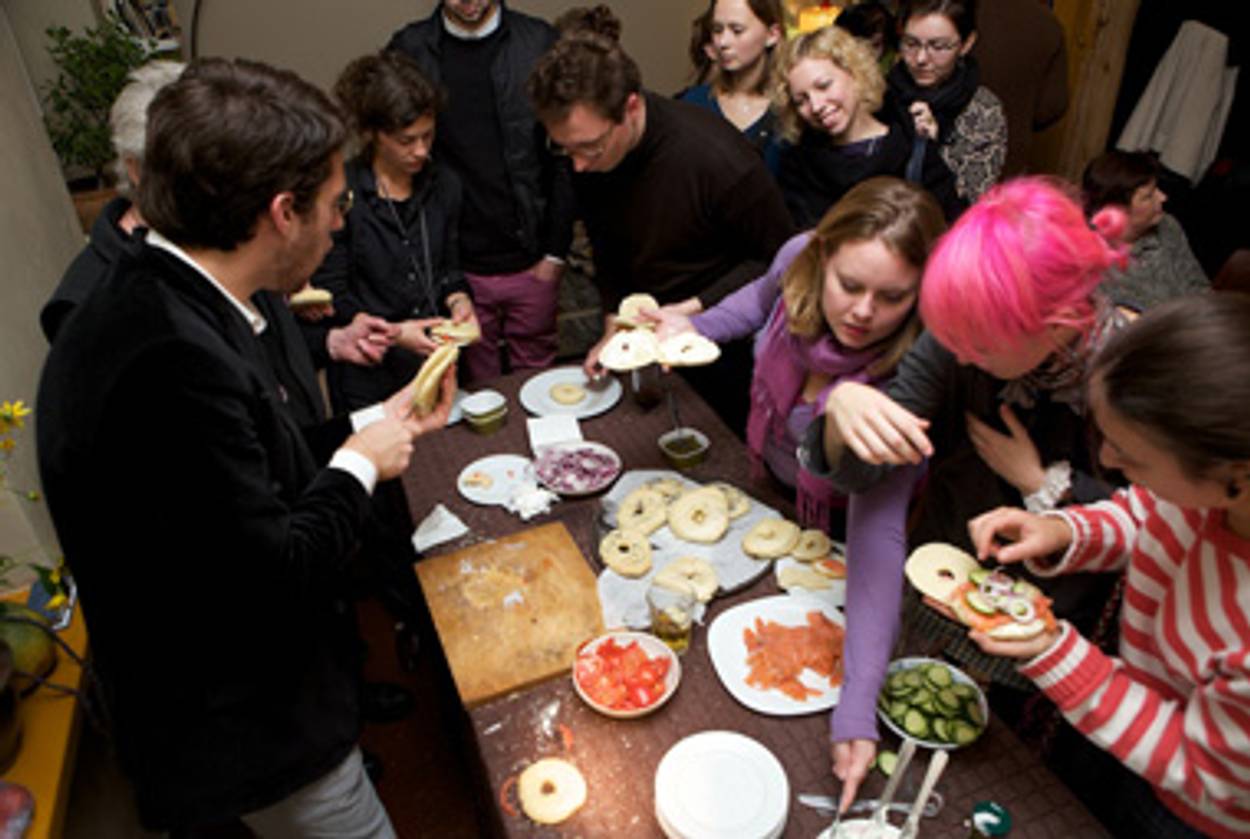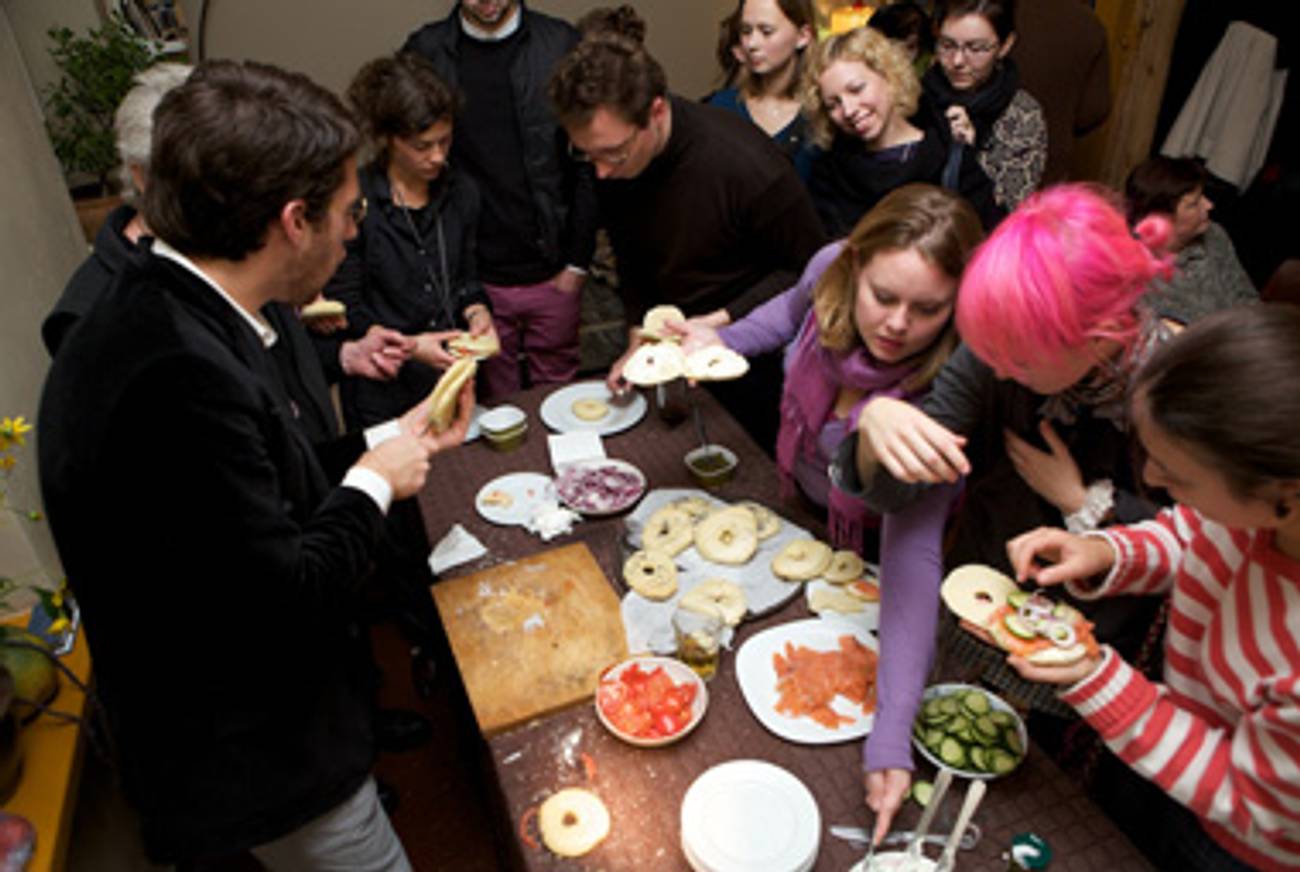Holey Mission
An American Jew brings bagels back to Vilnius




In the Lithuanian capital of Vilnius, the demise of bagelism—the science, production, purveyance, appreciation, and consumption of the bagel—coincided, unsurprisingly, with the effective end of Lithuanian Jewry. But after 70 long years, bagels have returned to the city once known as Northern Jerusalem: Last weekend, in the largest bagel event in modern Lithuanian history, the Jewish-slash-American staple was reintroduced to 200 curious, hungry, and slightly mystified Vilniusites.
Welcome to the Vilnius Bagel Project.
It began quietly, almost accidentally. Three weeks ago, my roommate, Jake Levine, and I—the Jewish-American representation for this adventure—were loitering with some semi-employed local artists in a Vilnius parking lot. The overtired, drunken conversation careened from what we were doing in Lithuania (Fulbright-funded Jewishy stuff via poetry and prose, respectively) to the ongoing effacement of Litvak heritage. This prompted a string of proposed cultural nostrums, all prima facie preposterous, potentially insulting, and certainly less than feasible (e.g., Hug-a-Jew Day), until holy inspiration struck: “We should reestablish bagels in Vilnius.”
The empty invite and half-serious suggestion, those cornerstones of American hospitality, have no place here in Vilnius: The next day, the lot of us went shopping for poorly translated bagel ingredients. And so, despite our heretofore untested bagel-making skills—the only baking experience either of us had involved straightforward, yeastless cookies—the Vilnius Bagel Project was born. We found our recipe on Wikipedia (though we didn’t mention this to the Lithuanians); this wasn’t about Montreal vs. New York, big vs. small, soft vs. hard, or the controversies of newfangled bagel flavors—just bagels in Vilnius, a city where anything Jewish struggles to survive.
A local restaurateur offered free space in any of his three establishments. Artsy posters were printed and pasted on café walls and abandoned storefronts. Fliers were handed out at the university. Bagel buzz was building—we received inquiries and good wishes from Naples, Berlin, Toronto, and Jerusalem.
The event was hosted at Jalta, a hip restaurant outside Vilnius’ Old Town, where 100,000 Jews, 105 synagogues, and two ghettos used to be. The crowd was mostly young, but diverse—artists, students, professionals, and expats, with a few unwitting and increasingly bewildered patrons.
Darius Miksys, a Lithuanian artist, deejayed, and American-born photographer Andrew Miksys (no relation) recorded the entire process, from kneading onward. We had prepared the pre-boiled and -baked proto-bagels in our spectacularly unequipped and unsuitable kitchen: We had no measuring cups, and the bagels refused to rise for hours in our drafty apartment. Then we brought them to the restaurant for the final steps, so that a) they might be fresh, and b) the kitchen staff could witness the process up close, as they had requested. Everyone cheered when the first bagels floated in the beat-up industrial pot. And though we had had a minor salt mishap, and despite the lack of malt (which we could not find anywhere), and even if we couldn’t approach bakery-grade aesthetics, those bagels were beautiful and delicious—especially considering almost no one there had ever seen or tasted one before.
At 9 that night, Darius faded the music out, and the program began. The squished crowd greeted the heaping platter of sesame, poppy, and plain bagels with an awed and confused silence, then—and this was the nachas-schepping apex—applause. Jake and I set the platter down at the table, in an actual spotlight, and introduced the bagels (further applause) and ourselves (some leftover applause). We opened with an inspired spiel discriminating between the bagel and its Lithuanian impostors—namely, the insultingly sweet and crunchy barankas, and the simply heretical riestainiai—because, despite some recent and nearby confusion, some dough with a hole a bagel does not make. We then conducted a bagel demonstration-cum-lesson. This isn’t as absurd as it might seem (OK: yes, it is), but we were serving a potentially overwhelming gastro-cultural experience—unsliced bagels, cream cheese (known here exclusively as “Philadelphia”), tomatoes, cucumbers, onions, lox, and capers—to a tragically bagel-ignorant audience. I cut and unfolded the model bagel. I taught them how to construct and layer properly—densest on the bottom—and how you can schmear with imprudence, and to be gentle with the lox, as it is the sandwich’s soul. Jake, mindful of the insufficient supply, requested that everyone please refrain from being a khazer, then he read some of his poetry, with bagel replacing choice nouns: “a snow begins the bagel /monitors turn bagel …”
And then we let them loose, invited them to the promised food—and no one moved. Lithuanians aren’t accustomed to the smorgasbord, or even the buffet table, so it took some prodding. But then they ate. The five-or-so dozen shockingly good bagels were polished off, down to the sesame seeds; the cream cheese bowl was scraped clean.
Afterward at the bar, with the l’chaims/i sveikatas rising from the mostly kosher debauchery, there was a batch of excited questions. What’s with the hole? Is today a Jewish holiday? Is it an American holiday? Are you going to sell bagels? Why did bagels disappear in Lithuania? What’s more Jewish, matzos or bagels? Some didn’t believe that we had boiled the bagels. (I showed them the massive pot, now filled with filmy bagel broth.) The guests, not 10 minutes after finishing their sandwiches, were already nostalgic. Elena, an enchanting 25-year-old visual artist, compared her first bagel bite to being kissed for the first time.
The chef of the restaurant had somehow intuited that bagels are best enjoyed as breakfast—an encouraging evolutionary leap in local bagel culture—and put hers aside. I noticed a lot of chins smeared with cream cheese.
Judita, one of the few local Jews in attendance, gave her daughter, awake past her bedtime, her first bagel to nibble on. An older gentleman mentioned that he remembered two Jewish women who used to make bagels before the war—but those bagels, he said, weren’t nearly as good as these. Professors from the university came, as did several employees of the American embassy. My landlady’s daughter was there. An Estonian guy I had met the night before swung by. It was a heartening cross-section of the usually cliquey Vilnius. Many were prematurely negotiating yet another historical first—the bagel afterparty.
Dave, a pastor visiting from San Francisco, approached me. And though we hadn’t once mentioned, not even obliquely, local Jewish history, or the Holocaust, or the current political climate, or the intermittent anti-Semitism, or the biting apathy that’s infinitely more agonizing—Dave understood that none of this had to be mentioned. He was crying when he thanked me. “It’s a triumph,” he said. He hugged me and returned to his bagel.
Menachem Kaiser is a Fulbright Fellow studying contemporary Jewish issues in Lithuania and the surrounding region.
Menachem Kaiser is a Helen Zell Fellow at the University of Michigan, as well as a Wexner Graduate Fellow.